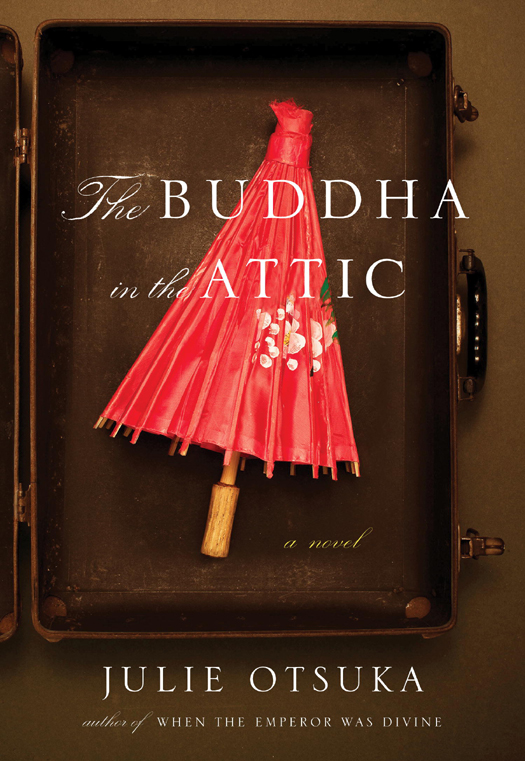
The Buddha in the Attic
فرمت کتاب
ebook
تاریخ انتشار
2011
Reading Level
4-5
ATOS
6
Interest Level
9-12(UG)
نویسنده
Julie Otsukaشابک
9780307700469
کتاب های مرتبط
- اطلاعات
- نقد و بررسی
- دیدگاه کاربران
نقد و بررسی

Starred review from July 18, 2011
In the early 1900s, numerous Japanese mail order brides came to America seeking better lives. Otsuka's (When the Emperor was Divine) latest novel paints a delicate, heartbreaking portrait of these women. Using a collective first-person narrator ("On the boat we were mostly virgins."), Otsuka looks at the experiences of these "picture brides," organizing their stories into themes which include: their arrival in America; their first nights with their husbands; their interactions with white people; their children; and finally, the experience of World War II. Each section is beautifully rendered, a delicate amalgam of contrasting and complementary experiences. Readers will instantly empathize with these unnamed women as they adjust to American culture, a remarkable achievement considering Otsuka's use of the collective voice. Otsuka's prose is precise and rich with imagery. Readers will be inspired to draw their own parallels between the experiences of these women and the modern experience of immigration. By the time readers realize that the story is headed toward the internment of the Japanese, they are hopelessly engaged and will finish this exceptional book profoundly moved.

May 15, 2011
Otsuka, whose first novel (When the Emperor Was Divine, 2003) focused on one specific Japanese-American family's plight during and after internment, takes the broad view in this novella-length consideration of Japanese mail-order brides making a life for themselves in America in the decades before World War II.
There are no central characters. A first-person-plural chorus narrates the women's experiences from their departure from Japan until they are removed from their homes and shipped to the camps, at which point the narration is taken over by clueless whites. Rather than following an individual story, Otsuka lists experience after experience, piling name upon name. Voyaging across the Pacific to California, the women's emotions range from fear to excitement, but most, even those leaving behind secret lovers, are hopeful. Reality sets in when they meet their husbands, who are seldom the men they seemed from their letters and photographs. And the men's reactions to their new wives vary as much as the women's. Some are loving, some abusive. For all their differences, whether farm workers, laundrymen, gardeners or struggling entrepreneurs, they share a common outsider status. Soon the majority of women who stay married—some die or run off or are abandoned—are working alongside their husbands. They begin to have babies and find themselves raising children who speak English and consider themselves American. And the women have become entrenched; some even have relationships with the whites around them; many are financially comfortable. But with the arrival of the war against Japan come rumors. Japanese and white Americans look at each other differently. Loyalty is questioned. Anti-Japanese laws are passed. And the Japanese themselves no longer know whom to trust as more and more of them disappear each day. Once they are truly gone, off to the camps, the whites feel a mix of guilt and relief, then begin to forget the Japanese who had been their neighbors.
A lovely prose poem that gives a bitter history lesson.
(COPYRIGHT (2011) KIRKUS REVIEWS/NIELSEN BUSINESS MEDIA, INC. ALL RIGHTS RESERVED.)

March 15, 2011
In her widely admired debut novel, When the Emperor Was Divine, Otsuka portrayed the internment of Japanese Americans during World War II. Here she retreats a few steps, following a group of Japanese women who travel to early 1900s San Francisco as mail-order brides. Given the success of Emperor, it's no surprise that this new work is getting a 75,000-copy first printing, a reading group guide, and a seven-city tour. I'm looking forward to this one.
Copyright 2011 Library Journal, LLC Used with permission.

Starred review from August 1, 2011
Otsuka's stunning debut, When the Emperor Was Divine (2002), a concentrated novel about the WWII internment of Japanese Americans, garnered the Asian American Literary Award, the ALA Alex Award, and a Guggenheim. Her second novel tells the stories of Japanese mail-order brides at the start of the twentieth century in a first-person-plural narrative voice, the choral we. This creates an incantatory and haunting group portrait of diverse women who make the arduous ocean journey to California buoyant with hope only to marry strangers nothing like the handsome young men in the photographs that lured them so far from home. Prejudice and hardship soon transform the brides into fingers-worked-to-the-bone laborers, toiling endlessly as domestic workers, farmers, prostitutes, and merchants. Every aspect of female life is candidly broached in Otsuka's concise yet grandly dramatic saga as these determined, self-sacrificing outsiders navigate the white water of American society, only to watch their American-born children disdain all things Japanese. Drawing on extensive research and profoundly identifying with her characters, Otsuka crafts an intricately detailed folding screen depicting nearly five decades of change as the women painstakingly build meaningful lives, only to lose everything after Pearl Harbor. This lyrically distilled and caustically ironic story of exile, effort, and hate is entrancing, appalling, and heartbreakingly beautiful.(Reprinted with permission of Booklist, copyright 2011, American Library Association.)

























دیدگاه کاربران